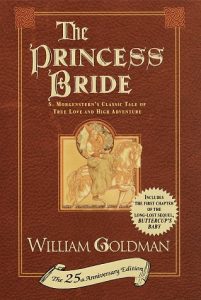
 Literature Guides
Literature Guides
The Princess Bride Quotations and Analysis
Quotations and Analysis
“I have stayed these years in my hovel because of you. I have taught myself languages because of you. I have made my body strong because I thought you might be pleased by a strong body. I have lived my life with only the prayer that some sudden dawn you might glance in my direction. I have not known a moment in years when the sight of you did not send my heart careening against my rib cage.”
At this point the reader is introduced to the depth of Westley’s pure and unconditional love for buttercup which is his prime motivator throughout the novel.
He strengthens his mind and his body just for her and even gives up his life trying to rescue her. Westley’s love for Buttercup is his sole purpose and is even the reason for his survival from Dread Pirate Roberts. Goldman presents an unwavering love that is only possible in fairytales.
“I’m getting much smarter as I age. I say you are a coward and you are; I think you hunt only to reassure yourself that you are not what you are: the weakest thing to ever walk the Earth.”
It seems that the more Buttercup ages the more she develops emotionally and intellectually. Humperdinck no longer fools her and now and she analyzes his character for the reader, she characterizes him as a coward who hides behind his hunting to showcase his bravery and to mask his cowardice.
“that doesn’t mean I think they had a happy ending, either. Because, in my opinion, anyway, they squabbled a lot, and Buttercup lost her looks eventually, and one day Fezzik lost a fight and some hot-shot kid whipped Inigo with a sword and Westley was never able to really sleep sound because of Humperdinck maybe being on the trail. I’m not trying to make this a downer, understand. I mean, I really do think that love is the best thing in the world, next to cough drops. But I also have to say, for the umpty-umpth time, that life isn’t fair. It’s just fairer than death, that’s all.”
One of the most enticing things about the novel is the freedom the author gives to his readers. Goldman says his father ends the story in “ they lives happily ever after”, S. Morgenstern’s version ends in the demise of the four characters, and he himself believes they survive but live on to lead a not so perfect life. No matter what the three versions state, Goldman asserts that the story is for the readers to decide and reimagine for themselves.



